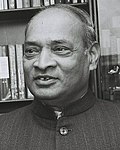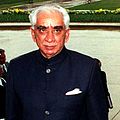This article has multiple issues. Please help improve it or discuss these issues on the talk page . (Learn how and when to remove these messages)
|
| Deputy Chairman of Planning Commission | |
|---|---|
 | |
 | |
| Status | Abolished |
| Appointer | Prime Minister of India |
| Term length | Five years |
| Inaugural holder | Gulzarilal Nanda |
| Formation | 17 February 1957 |
| Final holder | Montek Singh Ahluwalia |
| Abolished | 25 May 2014 |
Since the Prime Minister of India happened to be the ex-officio chairperson of Planning Commission of India, the position of the deputy chairperson had great significance.
Contents
From 1957 until 2014 23 persons have served as the deputy chairmen, but any woman not served in this post. The deputy chairmen Gulzarilal Nanda, P. V. Narasimha Rao and Manmohan Singh who served as Prime Minister of India. [a] And Pranab Mukherjee who served this post in from 1991 to 1996, after served as the President of India. Two future chief ministers, former central ministers served in this post.













